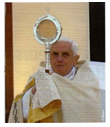My brothers, my sisters, my friends,
– accept, accept to offer to Him Who gave us everything, Who did not come to judge the world but to save it (cf. John 3, 17), accept to recognise the active Presence in your lives of He Who is Present here, exposed before our eyes. Accept to offer Him your own lives!
Mary, the Holy Virgin, the Immaculate Conception, accepted, two thousand years ago, to give everything, to offer her body in order to welcome the Body of Her Creator. All came from Christ, even Mary; everything came through Mary; even Christ. Mary, the Holy Virgin is with us this evening, in front of the Body of Her Son, one hundred and fifty years after she appeared to little Bernadette.
Holy Virgin, help us to contemplate, help us to adore, help us to love more He Who loves us so much, in order to live eternally with Him.
A huge crowd of witnesses is invisibly present next to us, right next to this blessed grotto and in front of the church that was desired by the Virgin Mary, the crowd of all those brothers and sisters that have contemplated, venerated, adored the Real Presence of He Who gave even the last drop of His Blood, the crowd of all those brothers and sisters that have spent hours adoring Him in the Most Blessed Sacrament of the altar.
Tonight, we do not see them, but we do hear them that tell each and every one of us “Come, let yourselves be called, by the Master! He is here! He calls you (cf. John 11, 28)! He wants to take your life and unite it with His. Let yourself be taken by Him. Look no longer at your wounds, look at His. Look no longer at that which separates you still from Him and at the others; look at the infinite distance that He abolished by taking His Flesh, by mounting the Cross that man prepared for Him to mount and left Him to die on, to show you His Love. In His wounds, He takes you, in His wounds he hides you (…) do not refuse His Love.
The huge crowd of witnesses, that has allowed itself to enter into His Love, is the host of saints, in heaven that does not cease to intercede for us. They were sinners and knew it but they agreed not to look at their wounds but to look only at the wounds of Our Lord, in order to discover the glory of the Cross, to find the victory of Life over death. Saint Peter-Julian Eymard says it all when he exclaims “The Holy Eucharist is Jesus Christ past, present and future” (sermons and parish instructions from 1856, 4-2,1, from the meditation).





 Meditation by Pope Benedict XVI for the Eucharistic Procession at the Prairie in Lourdes, Sunday 14th September, 2008.
Meditation by Pope Benedict XVI for the Eucharistic Procession at the Prairie in Lourdes, Sunday 14th September, 2008.